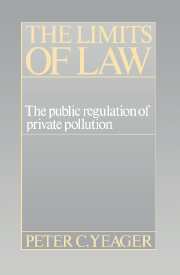Book contents
- Frontmatter
- Contents
- Preface
- Acknowledgments
- 1 The social production of business offenses
- 2 Bringing the law back in: an integrated approach
- 3 The politics of water: pollution policies to 1970
- 4 Contradiction and change: environmental consciousness and the mobilization of law
- 5 Legislating clean water: changing conceptions of environmental rights
- 6 Controls and constraints: from law to regulation
- 7 Enforcement: the social production of environmental offenses
- 8 Ecology, economy, and the evolution of limits
- Bibliography
- Index
8 - Ecology, economy, and the evolution of limits
Published online by Cambridge University Press: 23 May 2010
- Frontmatter
- Contents
- Preface
- Acknowledgments
- 1 The social production of business offenses
- 2 Bringing the law back in: an integrated approach
- 3 The politics of water: pollution policies to 1970
- 4 Contradiction and change: environmental consciousness and the mobilization of law
- 5 Legislating clean water: changing conceptions of environmental rights
- 6 Controls and constraints: from law to regulation
- 7 Enforcement: the social production of environmental offenses
- 8 Ecology, economy, and the evolution of limits
- Bibliography
- Index
Summary
What right has any citizen of a free country, whatever his foresight and shrewdness, to seize on sources of life for his own behoof that are the common heritage of all; what right has legislature or court to help in the seizure; and striking still more deeply, what right has any generation to wholly consume, much less to waste, those sources of life without which children or the children's children must starve or freeze?
William John McGee, “The Conservation Bill of Rights”These questions, offered rhetorically, have both a contemporary ring and unquestioned relevance for matters of ecological policy. In fact they were first published some 80 years ago by McGee, an advisor to Theodore Roosevelt who was once described as “the scientific brains” of the early conservation movement in the United States. In both their timelessness and their construction, these questions underscore the tension between law and ecology in our political economy.
The continuing relevance of these questions, of course, testifies to the limits to fundamental change that are inherent in all complex social organisms, whether capitalistic or socialistic or some other variant of large-scale human organization. Indeed, it is as difficult to imagine the once tightly organized Soviet political economy without its profligate corruption and inefficiencies as it is to conceive U.S. history without the tensions outlined in this book.
But all social systems possess unique histories and therefore uniquely characteristic sets of choices and constraints, themselves interrelated.
- Type
- Chapter
- Information
- The Limits of LawThe Public Regulation of Private Pollution, pp. 303 - 331Publisher: Cambridge University PressPrint publication year: 1991



